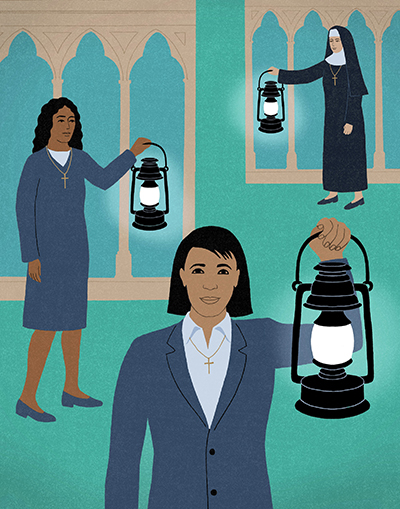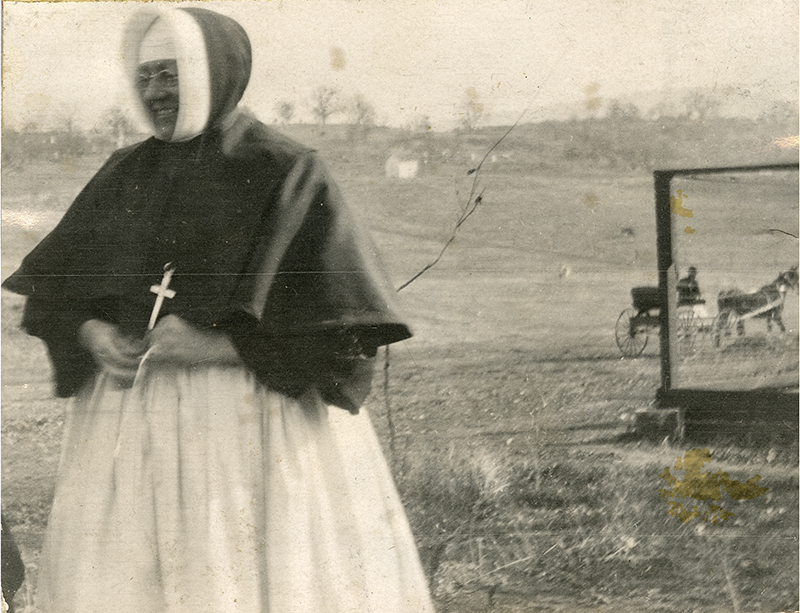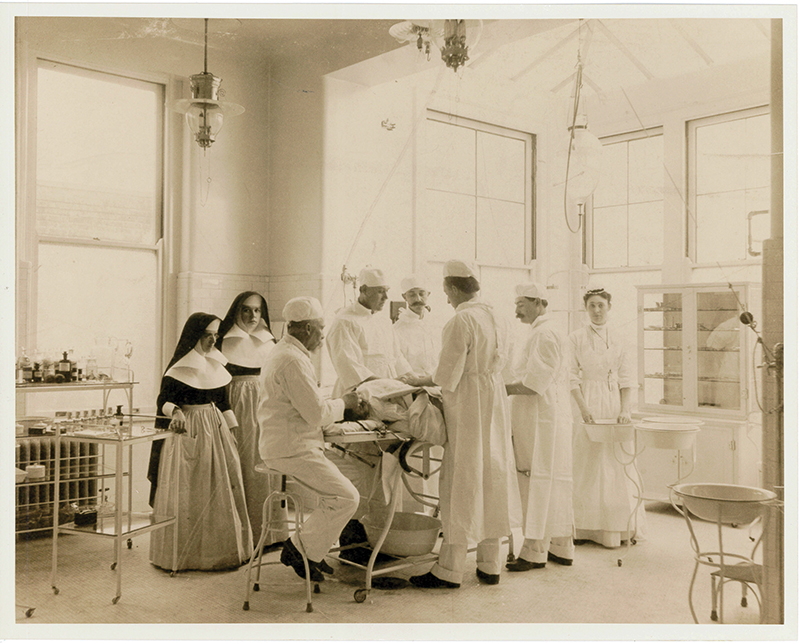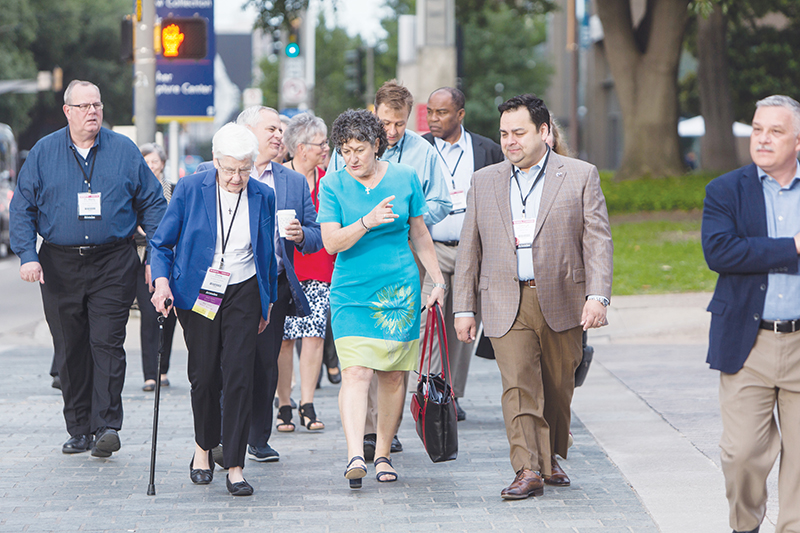Senior Director of Theology and Sponsorship, Catholic Health Association
In 2021, the Catholic Church began a three-year process called the Synod on Synodality to "provide an opportunity for the entire People of God to discern together how to move forward on the path toward being a more synodal Church in the long-term."1 When this process was announced, I intentionally kept my expectations at bay. Could synodality change anything? Why pay attention? The Catholic Church faces many challenges, as do the ministries in our Church, including health care. What could this synod process possibly offer?

But a morning in the Pastoral Center of the Archdiocese of San Antonio changed everything. I was curious enough about the synod to register for my diocese's listening sessions, where I participated at a table with several women who worked in a local parish. Their passion shamed me, as did their hope for this process: "Maybe this time, Sister, the Church will understand how much they need women."
I walked away from that gathering, aware that my hope for a church that welcomed the gifts of women was thawing. I feared the vulnerability, wondering if I could take another letdown.
SPEAKING TRUTH TO POWER
As the global church carried out a massive consultation process and every diocese around the world was called to take part in national and continental phases, the conversations kindled my hope further. The
U.S. Conference of Catholic Bishops report in October 2022 stated that nearly all synodal consultations recognized "women's unparalleled contributions to the life of the Church, particularly in local communities. There was a desire for stronger leadership,
discernment, and decision-making roles for women … ."2 The conversation with the women at my table had been replicated in nearly every diocese of the United States.
When the synod's "Working Document for the Continental Stage (DCS)" challenged Catholics everywhere to "enlarge the space of your tent," I was hooked.3 I read the paragraphs on "Rethinking Women's Participation" several times because they were so different in tone and content to other church documents: "From all continents comes an appeal for Catholic women to be valued first and foremost as baptized and equal members of the People of God. There is an almost unanimous affirmation that women love the Church deeply, but many feel sadness because their lives are often not well understood, and their contributions and charisms not always valued."4
I soon learned I was not alone in my sentiments, both of surprise and increasing hope. Theologian Susan Bigelow Reynolds wrote in Commonweal, "I found myself heartened by the DCS, both for the universality of its call to rethink women's participation in the Church and for the multiplicity of voices and perspectives represented therein."5 Indeed, she states that the document "suggests a sense among the faithful that the status quo not only represents a problem for women but, fundamentally, for the mission of the Church." The Spirit was speaking through the global consultation. This time, the women we sit next to in the pew, the women who serve in ministries and the women who have stayed were speaking truth to power, just when so many moved away and others spoke in carefully crafted statements that wouldn't spark yet another investigation.6

Expectations were high when the October 2023 synod participants were announced. The Vatican had confirmed women participants with voting rights for the first time in our Church's history, and that is a lot of history. Again, the synthesis report contained a different kind of language: "Churches all over the world have expressed a clear request that the active contribution of women would be recognized and valued, and that their pastoral leadership increase in all areas of the Church's life and mission. In order to give better expression to the gifts and charisms of all and to be more responsive to pastoral needs, how can the Church include more women in existing roles and ministries? If new ministries are required, who should discern these, at what levels and in what ways?"7 Participants at the October synod from different parts of the world have all mentioned how critical women's participation in the Church was to all present in Rome.
The synod is for everyone. All of us create communion by participating and going forth on mission. So, how do Catholic health care ministries contribute to this process? As a ministry of the Church, we need to find ways to promote synodality. Discernment and formation need to model the synodal process, as Darren Henson, CHA's senior director of ministry formation, recently wrote in the winter issue of Health Progress.8

But synod is calling us to do more: Catholic ministries must assume their synodal responsibility in welcoming the gifts and diversity of women. The team that gathered the synod reports from all over the world invited us to "focus on what the Lord is calling us to through the experience of lived synodality: 'Enlarge the space for your tent, spread out your tent cloths unsparingly; lengthen your ropes and make firm your pegs.'" (Isaiah 54:2) The words of Isaiah "invite us to imagine the Church similarly as a tent, indeed as the tent of meeting, which accompanied the people on their journey through the desert: called to stretch out, therefore, but also to move."9 Enlarging the tent on women's leadership will offer a unique gift to our Church and women everywhere because it is rooted in our identity and the power of a culture centered on human flourishing, the power of "how" we care. Here are some first steps: embrace our heritage of women's leadership, step up to continue our legacy, remain grounded in scripture along the way and recognize the time is now to enlarge the tent.
EMBRACING WOMEN'S HERITAGE IN CATHOLIC HEALTH CARE
To further recognize the value of women's leadership, we need to begin with who we are. A prophetic way for our ministry to engage with synodality is to return to our history with
new questions. What does the heritage of women's leadership in Catholic health care offer our Church today? How has women's leadership in every area of our ministry created spaces where all gifts are welcomed and encouraged?
We have heard our origin stories — the sisters who braved the frontier to open and build hospitals — but have we paused enough to truly recognize how unusual that was at the turn of the 20th century, when women couldn't even vote? And beyond the founding years, do we recognize the ongoing contributions of women leaders?
The systems we serve are the result of entrepreneurial women who led with a keen awareness of the signs of their times and built Catholic health care in America.10 Barbra Wall, who has written about this story, notes that "The public face of Catholic authority has always been decidedly male; it is indeed ironic, then, that the overwhelming majority of Catholic hospitals in the United States were established and originally managed by women."11 How often do we pause to consider the improbability of our ministries to prosper in that environment?

We need to cherish the photographs. In every decade of our ministries' histories, women are prominent. The pictures tell an incredible story unique to North America: women helping in hospital wards, deliberating around a boardroom table and working in other roles. This happened when most other ministries and industries barred or could not even imagine women in leadership. Yet, in our histories, we see women in the C-suite, governance and general administration. Our photographs contrast sharply with those that documentarian Immy Humes published in a collection of images from 1862 to 2020 titled The Only Woman. Her questions could be ours: "Why was she there? Did the men see her as an 'infiltrator'…? More important, how did she feel being there?"12
Sisters are women, too. We need to frame our history in its context. Sure, the leadership in the early days was mostly composed of sisters; some of us would argue they were able to do it only because they were sisters. And what we learn from this sisterhood will be key to the future, encouraging support networks for women. Still, we need to remember that this was a time when even a sister could not attend The Catholic University of America, when male clergy ruled over Catholic life. Sisters built health care systems long before the changes called for by the Second Vatican Council, when it began moving the Church away from a clericalized culture where women had no authority. What can we still learn from this history? How will we ensure that this heritage of women's leadership is truly one of Catholic health care?
STEPPING UP TO CONTINUE OUR LEGACY
The synod is teaching us the value of participation, communion and cherishing diverse collaboration as a gift from God. Fewer sisters will remain at our tables, but they long for the women of our
ministry to step confidently into their voices and gifts. Together, they will always leave their foot at the door so other women can enter. They will always challenge us to do more and better because they know women have leadership, authority and
gifts.
The sisters have done their part; now, our ministries need to step up and do better. We need to continue modeling for church and society what welcoming the gifts of women can do for human flourishing.
SR. TERESA MAYA, PhD, CCVI is senior director, theology and sponsorship, for the Catholic Health Association, St. Louis.
NOTES
- "What Is Synodality?", Synod 2021/2024, https://www.synod.va/en/the-synod-on-synodality/what-is-the-synod-about.html.
- "National Synthesis of the People of God in the United States of America for the Diocesan Phase of the 2021-2023 Synod," USCCB, 2022, https://www.usccb.org/resources/US%20National%20Synthesis%202021-2023%20Synod.pdf.
- "Working Document for the Continental Stage," General Secretariat of the Synod, October 2022, https://www.usccb.org/resources/Documento-Tappa-Continentale-EN.pdf.
- "Working Document for the Continental Stage."
- Susan Bigelow Reynolds, "Are We Protagonists Yet?", Commonweal, December 9, 2022, https://www.commonwealmagazine.org/women-church-synod-francis-catholic.
- Annmarie Sanders, However Long the Night — Making Meaning in a Time of Crisis: A Spiritual Journey of the Leadership Conference of Women Religious (Scotts Valley, California: CreateSpace, 2018); Laurie Goodstein, "Vatican Ends Battle With U.S. Catholic Nuns' Group," The New York Times, April 16, 2016, https://www.nytimes.com/2015/04/17/us/catholic-church-ends-takeover-of-leadership-conference-of-women-religious.html.
- "XVI Ordinary General Assembly of the Synod of Bishops First Session (October 4-29, 2023): Synthesis Report," XVI General Ordinary Assembly of the Synod of Bishops, https://www.synod.va/content/dam/synod/assembly/synthesis/english/2023.10.28-ENG-Synthesis-Report.pdf.
- Darren Henson, "How the Synod on Synodality Serves as Model for Ministry Formation," Health Progress 105, no. 1 (Winter 2024): 47-50.
- "Working Document for the Continental Stage."
- Suzy Farren, A Call to Care: The Women Who Built Catholic Healthcare in America (St. Louis: Catholic Health Association, 1996).
- Barbra Mann Wall, Unlikely Entrepreneurs: Catholic Sisters and the Hospital Marketplace, 1865-1925 (Columbus, Ohio: Ohio State University Press, 2005). And Wall's other book: American Catholic Hospitals: A Century of Changing Markets and Missions (New Brunswick, New Jersey: Rutgers University Press, 2011), 59.
- Immy Humes, The Only Woman (New York: Phaidon Press, 2022); Lauren Christensen, "'The Only Woman'" in the Room," The New York Times, July 29, 2022, https://www.nytimes.com/2022/07/29/books/review/the-only-woman-immy-humes.html.
It Is Time to Enlarge the TentJill Fisk, MATM What might it look like for Catholic health care to truly embody this visible commitment to equitable workforce practices for women? How might our diversity, equity, inclusion and belonging (DEIB) practices set the standard in for-profit health care entities and other church ministries in promotion, succession planning and microaggression education? Like the sisters before us, we must keep the call to embody a healing ministry at the forefront at executive tables and lead the way to demonstrate belonging that models our highest view of human dignity. But perhaps, more importantly, what do we risk if we fail to maintain our commitment? Honoring the synod call requires paying special attention to the signs of the times. We are challenged to listen to everyone, especially those persons "who may risk being excluded: women, the people with disabilities, refugees, migrants, the elderly, people who live in poverty, Catholics who rarely or never practice their faith, etc."1 And engagement with new generations remind us that we must invite new conversations to the table to respond to our changing communities. What is ours to do as Catholic health care?
The synod moves us on the journey to the reign of God, and there is always more we can do. May we all continue to bear the fruits of the synod through gender inclusivity in Catholic health care so that we may truly "enlarge the space of our tent." JILL FISK is director, mission services, for the Catholic Health Association, St. Louis. NOTES
|
Authors' note
The authors wanted readers to know they were inspired to write this article because women are half of the Church. As they wrote, they held in their hearts women who love the Church and serve their parishes; women who are care providers and need support networks to know they are not alone. They write for those who serve in the Catholic health care ministry and the accounts of joy and adversity they have been humbled to hear. And they write for children, the future of the Church.
Grounded in Scripture: Women's LeadershipAs we grow into the synod model of communion, participation and co-responsibility, we must also reflect upon women's inclusivity in the call of sacred Scripture. In the Hebrew text, we discover Deborah as the only woman among Israel's leaders who ruled and also served as a prophet (Judges 4:4-5). Paul's writings highlight Phoebe as a sister in ministry, deacon and primary benefactor to his missionary ministry (Romans 16:1-2). So, too, the Gospel writers witness to the women surrounding Jesus' ministry: Mary, Martha and Mary Magdalene. These scriptural models of inclusion for women must inform how we are to continue the Church's ministry for women to flourish, both in the ongoing work of the synod and our response in Catholic health care. Women at the time of Jesus were not considered full persons and were instead viewed as the property of men and could not study the Torah or participate in public life. We should be inspired every time Jesus refuses to treat women as inferior and speaks and interacts with them in public. Just as Jesus valued and cared for women in the Bible, our ministries need to be places where women are treated with dignity. Our ministries need to be places where women are heard, healed and safe because this is who we are as a Catholic ministry: the healing ministry of Christ. When rooted in Scripture, the gaps in our welcoming become visible. What is ours to do in a time when we are called to promote human flourishing? —Jill Fisk and Sr. Teresa Maya |
